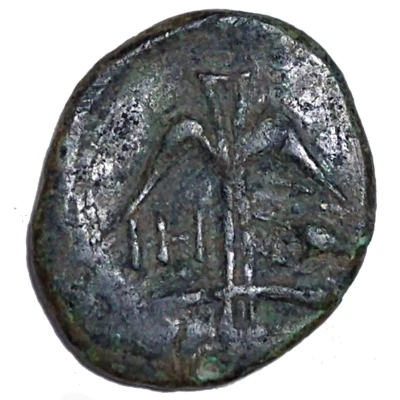


© Roma Numismatics Limited
Tetradrachm - Meno 200 BC - 175 BC
| Silver | 16.85 g | 32 mm |
| Issuer | Apollonia Pontika (Thrace) |
|---|---|
| Type | Standard circulation coin |
| Years | 200 BC - 175 BC |
| Value | Tetradrachm (4) |
| Currency | Drachm |
| Composition | Silver |
| Weight | 16.85 g |
| Diameter | 32 mm |
| Shape | Round (irregular) |
| Technique | Hammered |
| Demonetized | Yes |
| Updated | 2024-10-10 |
| Numista | N#199779 |
|---|---|
| Rarity index | 100% |
Reverse
Cult statue of Apollo Iastros standing facing, head left, holding long laurel branch in right hand, upon which a bird is perched, and bow and arrows in left hand; on ground line, another arrow.
Script: Greek
Lettering:
ΙΑΤΡΟΥ
ΑΠΟΛΛΩΝΟΣ
ΜΕ ΝΩ
Comment
A unique and unpublished variant. For type cf. S. Topalov, Apollonia Pontica. Contribution to the Study of the Coin Minting of the City, Sofia 2007, pp. 624, #98 (magistrate name ΑΘ-Ε).The coin in the main image (16.85g, 32mm, 1h, Near Extremely Fine):
◦ Auctioned by Roma Numismatics Ltd, Auction XVII, 28 March 2019, Lot 411. Sold for 7,500 GBP.
Apollo Iatros was the patron god of Apollonia Pontika (founded as Antheia, but later renamed in the god's honour). Apollo is depicted on this coin holding his bow and arrow, together with a laurel staff with a bird, alluding to his birth under a laurel tree and the numerous birds including hawks, ravens and crows considered sacred to him. An important sanctuary of Apollo Iatros was within view of the city on the island now called St Cryicus. Known as the 'Colossus of Apollonia Pontika', it was 13 m tall, designed by Kalamis of Athens and completed in 480 BC. It stood there for more than 400 years, until in 72 BC Marcus Terentius Varro Lucullus captured the city, seized the statue as a trophy, and had it transported to Rome. Scholars conventionally believe that the types of this coin depict this well known statue (see Pick, 1898, p. 169; Lippold, 1919, p. 1534; Levi, 1965, p. 92; Lacroix, 1949, pp. 248-249). (source: Roma Numismatics Auction XVII Catalog)
Interesting fact
The Tetradrachm - Meno coin from Apollonia Pontika (Thrace) is interesting because it features a unique blend of Greek and Thracian elements. The obverse side of the coin depicts the head of the Greek goddess Athena, while the reverse side shows a Thracian horseman, highlighting the cultural exchange and fusion that occurred in the region during that time period.



